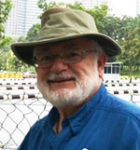
RICHMOND, California — In the early 1970s while teaching at the University of Rhodesia (Zimbabwe since independence in 1980), I interviewed African labor and farmer union leaders while researching the 1948 General Strike and the African Farmers Union. The interviews were in English, Shona, and Sindebele. I hired two undergraduate history majors to assist me with the African languages and cross-cultural social protocols. One of them, Misheck Sibanda completed a Ph.D. in History at Birmingham University and returned to Zimbabwe, served as the Chief Cabinet Secretary to President Robert Mugabe and Emmerson Mnangagwa, and recently retired after 17 years of service. The second student, Kevin Gumbo, became a teacher.
Allison Shutt a UCLA graduate student, contacted me in 1989. I shared my research notes and tapes stored in my garage archive. She wrote in The International Journal of African Historical Studies in 1997, “I am deeply grateful to Oliver Pollak for generously sharing his interview notes with Marirangwe farmers and officials in the African Farmers Union.” She has taught at Hendrix College in Conway, Arkansas, since 1997. Again in 2019 when she published a biography of Jasper Savanhu in African Studies she wrote, “I dedicate this article to Oliver Pollak whose original interview with Jasper Savanhu made this article possible and more importantly, inspired Savanhu to write his memoir prospectus.”
In 1981 I met Fay Southwell (1891-1990) at a party hosted by graduate student Jane Cohen. Fay, a 1920s University of Nebraska graduate, taught high school English in Omaha for decades. Fay had typed her English great-great grandparents 1858-1868 diary. It revealed poor relief, mutual benefit pig insurance, and the difficulty of emigrating to the United States during the Civil War. They arrived in Jacksonville, Illinois, in 1867 and lived with their daughter who needed help with two young children after being widowed in 1866. I published “Down and Out in Lincoln and Nettleham, an English Commonman’s Diary” in the Illinois Quarterly (1982). The title was a play on George Orwell’s depression era novel, Down and Out in Paris and London (1933).
Ten days ago I got an email out of the blue from Danni Parenteau. Unknown email senders are suspicious. Nonetheless I opened it. Danni, bearing the middle name Fay, is “obsessed” with learning the stories of her family. I shared my four-decades old ¾ inch thick file.
On the second night of Hanukkah I got an email from Kristen Skedgell, a playwright, spiritual searcher, and psychiatric social worker, who I had interviewed for a story about her grandfather William Castleman, Omaha and Chicago publisher and social activist. The story will appear shortly in the revived printed edition of Western States Jewish History. The linear foot of research is destined for the garage. Kristen wrote,
Dear Oliver,
I’ve been wanting to tell you about a development in my life which you started. I’m attending temple, going to Torah Study and just participated in my first ever Hanukkah Shabbat. I’m finally returning my roots!
Before you came along, poking into the roots of my family tree, I all-but-never acknowledged my Jewishness. Since this all began, I’ve become acquainted with yet another cousin in Paris (who contacted me out-of-the-blue) along with Dan in Israel and my cousin Emily in New York.
A shaman friend said now that we have a new generation in the family (a granddaughter from my son and his partner) the ancestors are contacting me.
Thank you for bringing this wonderful world to my attention. Your curiosity and generosity brought me to the world to which I belong.
Happy Hanukkah, Oliver.
Peace and good health to you and yours,
Kristen
I responded, “OMG. I’m so privileged for having been part of your spiritual journeys. In these times newly rediscovered blessings are a Mitzvah. I am regularly stunned by the power of history. Light the candles. May I publish your letter in an online Jewish newspaper??”
What a blessing to be a historian, teach students, be read, observe, experience and influence public perception if not policy. My garage, not a cave containing the Dead Sea Scrolls, does contain accretions of knowledge. The power of history lies in the privilege to record stories that are part oral, part memory, and part fragmented documentation. The printed word is shared with a wider public. As a coda the San Diego Jewish World is instrumental, providing a platform for stories that seek understanding by studying the past.
*
Oliver B. Pollak, Ph.D., J.D., a professor emeritus of history at the University of Nebraska Omaha, and a lawyer, is a correspondent now based in Richmond, California. He may be contacted via oliver.pollak@sdjewishworld.com